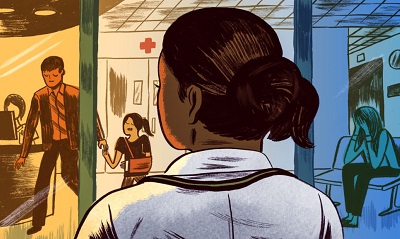DISCLAIMER
The information and materials accessed through or made available for use on any of our Sites, including, any information about diseases, conditions, treatments, or medicines, are for informational purposes only. The Content is not intended to be and is not a substitute for professional medical advice, diagnosis, or treatment, and your participation on our Sites does not create a healthcare professional-patient relationship. You should consult a doctor or other qualified health care professional regarding any questions you have about your health or before making any decisions related to your health or wellness. Call your doctor or 911 immediately if you think you may have a medical emergency.compose your message
message sent
email sent successfully
Trusted Resources: News & Events
Latest announcements and gatherings
My medical school lesson was tinged with racism. Did that affect how I treated a sickle cell patient years later?
The young woman was curled up in a ball. She was sweating and shivering from pain. As she answered my questions, all my many, many questions, tears fell silently from her eyes.
I was a third-year medical student, and the resident I was working with had asked me to evaluate this woman. She had been here several times before. She was in the middle of a sickle cell crisis.
I remembered this young woman while reading STAT’s recent story about how too many patients with sickle cell face exhausting, infuriating and life-threatening delays in getting care when they arrive in emergency rooms in excruciating pain from a restricted flow of oxygen to their organs.
Thinking back, I’ve recognized the truth of that article: We don’t always take sickle cell seriously. I realized, too, that I, a doctor of color, might be complicit in bias against these patients. The more I think about it, the more I realize how deep the roots of that injustice stretch.

 +myBinder
+myBinderRelated Content
-
videos & visualsSickle cell sunday 10, Telling people your limitationshttps://www.youtube.com/watch?v=W9TIORqs...
-
education & researchPodcast: How New Gene Therapies for SCD May Impact Women’s FertilityAs we closed 2023, the Food and Drug Ad...
-
education & researchStaying Hydrated When You Have Sickle Cell DiseaseWhen you live with sickle cell dise...
-
people & placesSantosh L. Saraf, MDDr. Santosh Saraf is an assistant profes...
-
news & eventsFlying doctor takes to the skies after sister’s deathOlamide Orekunrin was studying to become...
-
people & placesSusan Paulukonis, MA, MPHSusan Paulukonis is a rare disease epide...
-
people & placesFondation Pierre FabreRecognized as a public utility since 199...
send a message
To improve your experience on this site, we use cookies. This includes cookies essential for the basic functioning of our website, cookies for analytics purposes, and cookies enabling us to personalize site content. By clicking on 'Accept' or any content on this site, you agree that cookies can be placed. You may adjust your browser's cookie settings to suit your preferences. More Information
The cookie settings on this website are set to "allow cookies" to give you the best browsing experience possible. If you continue to use this website without changing your cookie settings or you click "Accept" below then you are consenting to this.
Support for this site is provided by

This platform is made possible through a partnership with the Sickle Cell Disease Association of America, Inc. (SCDAA) and its member organizations. SCDAA's mission is to advocate for people affected by sickle cell conditions and empower community-based organizations to maximize quality of life and raise public consciousness while advancing the search for a universal cure.




